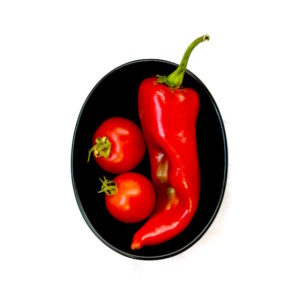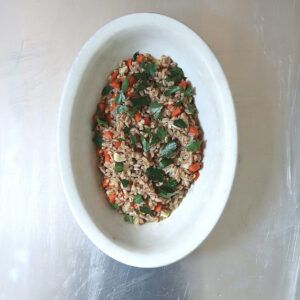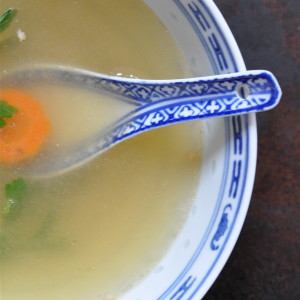Cornish Game Hens with Barley Salad
As I write, relief has given way to exhaustion. I can’t pretend I supported the outgoing political administration or the values they represent. But this is a food blog, not a political one, and if you’re here, you want a break from politics.
So let’s talk game hens. And barley.

Last summer I opened my door to find three bags of groceries. There is nothing unusual about this, except they weren’t mine.
I telephoned Amazon (where else?) to report the delivery and was told to keep the food. Amid the canned broccoli and frozen raspberries (Really. And in mid-August, no less) was a bag of barley.

Not the barley.
I did not grow up in a barley-eating household. Occasionally there was a soup boiled up from various dried pulses and grains. Manufactured by Manischewitz, this prodcut was sold in a plastic-wrapped stick shape. You unwrapped it over a pot of boiling liquid and simmered. After a few hours, soup.

A seven-volume remembrance is unlikely to emerge from this. Do try to hide you relief.
Barley and I parted ways for the next thirty years or so, until last summer’s unexpected delivery. I later learned groceries were left at wrong addresses all over town. Was the delivery driver a deranged Robin Hood, or just terribly inept?

Never mind. There I was, with somebody else’s dried prunes and fat-free yogurt. Also her a bag of barley.
(You don’t think it was a woman? Okay, there was also a single bar of dark chocolate. I rest my case.)
Groceries reveal a lot about people.
While barley often appears with lamb–and barley does pair well with all things lambesque–it is also excellent with poultry. Cornish game hens are basically very small chickens; if you cannot or do not want to use them, any kind of poultry will work: poussins, full-sized chickens, or chicken pieces. The trick is to roast your chicken, in whatever form, and then pour some or all or the roasting juices into your barley.

I realize this is hardly the culinary revelation of 2020, but culinary novelty isn’t what we’re after here. Life is taxing enough without it.

Cornish Game Hen with Barley Salad
Yield: feeds two modest eaters; if you’re feeding more people, scale up.
Preparation and cooking time: Poultry benefits from presalting, but this is optional; hands-on prep is about 15 minutes. Cooking time is about one hour.
Please read notes before cooking.
For the Poultry:
1 Cornish Game Hen, a full-sized chicken, a poussin, or chicken parts, as preferred.
3-4 large garlic cloves
juice of a fresh lemon
salt and pepper
A little Vermouth, white wine, or water, for the pan
A little olive or canola oil, for the pan
For the Barley Salad:
1/2 cup/115g pearled barley
two tablespoons olive oil (give or take; you might want a little more)
1 small garlic clove, peeled and minced (optional)
salt and pepper, to taste
lemon juice, to taste
two tablespoons parsley leaves
a handful of baby arugula or other sturdy, spicy baby salad greens (I didn’t measure other than taking a fistful)
a little sumac, optional
see notes for additions/variations
If you want to presalt your poultry, you can do so anywhere from three days to an hour before cooking. Use one teaspoon salt per pound/454g poultry, and don’t salt again until serving.
Allow the poultry to come to room temperature before cooking.
Preheat the oven to 350F/180C
If you are using a Cornish game hen or other full-sized bird, either trim the wingtips or wrap them in foil to avoid burning.
Place the bird, or pieces, in an oven-safe roasting pan.
I like to place several large garlic cloves in the bird’s cavity. I don’t bother peeling them.
Squeeze fresh lemon juice over the bird.
If you’ve pre-salted, do not salt again. If you have not salted, do so now. Add a little pepper.
Pour a little Vermouth, white wine, or water in the bottom of the pan. Add olive or canola oil. You want just enough to stop the bird from sticking or burning.
Slide it into the oven. Roast for about one hour, checking liquid level and to make sure wingtips are not burning.
For the barley:
Pour the barley into a medium saucepan and add just enough water to cover. Bring to a lively simmer, then turn heat down slightly; you want a gentle boil, but not a boisterous one. Cook, covered or not, for about 20 minutes, stirring occasionally, until barley is cooked and water is absorbed. Some people prefer barley with a bit of bite, others like it softer. You want it cooked, but nor are you looking for baby food.
Tip the barley into a large bowl. Add the olive oil and stir. Add the garlic, if using, the salt and pepper, and lemon. Taste constantly–seasoning amounts given are guidelines; season to your personal preference.
Stir in the parsley leaves and baby greens.
Check the game hen for doneness; it should take about an hour. It’s ready when the juices run clear and the legs move easily. Once it is cooked, remove from oven and either ladle the cooking juices into the barley or tip them from the roasting pan into the bowl (carefully!).
Stir the barley salad and taste for seasoning.
Serve by either placing the bird atop the barley or plating everything in individual bowls. More civilized people would heat the bowls. I do not.
A salad goes well with this, or you can call the greens in the barley the vegetable and not bother.
Any leftovers may be refrigerated up to four days. While the game hen and barley may be frozen up the two months, the barley will lose flavor. It best to freeze the bird and barley separately.
Any leftover bones may be frozen and used at a later date for broth (as in holiday season, which looms).
Notes:
Cornish game hens are not chickens, but small game birds that taste, I am sorry to say, like chickens. They weigh about one pound each (454 grams) and serve 1-2 people. Poussins, chicken pieces, or a full-sized bird may be substituted.
One half cup of barley (114 g) will feed two generously. One cup (225 g) will feed four.
Barley may be enhanced countless ways. I had leftover plain chickpeas in the fridge, so added them. Fresh herbs like cilantro, basil, or thyme, along with seasonings like coriander seed, sumac, and hot red pepper flakes make flavorful additions. (just not all at once!) Spicy baby arugula is delicious here.
This dish can be served to vegetarians by omitting the poultry (obviously), and dressing the barley with olive oil and balsamic vinegar to taste. Use good balsamic–red or white–and use it sparingly, and even the best goes from enhancing to overwhelming quickly.
The San Francisco War Memorial Opera House, December 2019.





